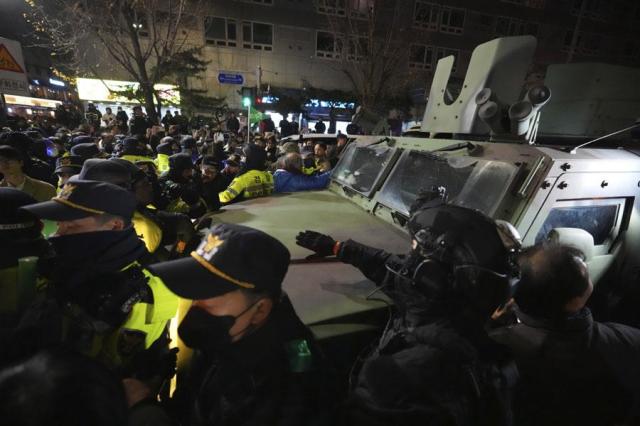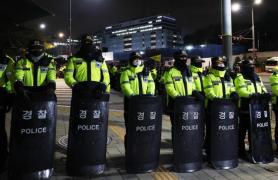
Yoon's opponents in the National Assembly immediately sought to mass at the legislature to block the decree. This led to a dramatic confrontation with soldiers over control of the building.
However, in the early hours of Wednesday, sufficient numbers of South Korean legislators gained entry to the chamber. Of the 300 members, 190 made it inside, which is far more than the 150 needed for the vote to take place. They unanimously voted down the president's order at around 1a.m.
Meanwhile, around the legislature, Yoon's opponents continued to gather in a tense standoff with military. By around 4:30 a.m., armed forces had withdrawn and Yoon had publicly conceded that his attempt had failed. The order would be rescinded. It ended a short-lived but nevertheless major constitutional crisis of authority between the president and the National Assembly.
What is martial law?
Martial law suspends key democratic freedoms, giving the military authority to exercise more powers in times of war or major threats to public safety.
A decree by Yoon's newly empowered martial law commander, Army Chief of Staff General Park An-su, proclaimed: "[…] all political activities, including those related to the National Assembly, regional assemblies, political parties, the forming of political organizations, rallies and protests are banned."
This martial law decree also declared heavy restrictions on press freedom and an end to an ongoing strike by junior South Korean doctors. However, little immediate attempt was made to implement the decree. As a result, there was widespread reporting of opposition activities in real time.
Why was martial law declared?
Yoon justified the martial law by accusing his domestic political opponents of "anti-state activities plotting rebellion."
He claims he was protecting the constitution from "pro-North Korean forces." This is a rhetorical label frequently applied by some South Korean conservatives to their liberal opponents.
The broader context to this decision is months of domestic political battles between the South Korean leader and the opposition-dominated National Assembly.
Yoon cited his opponents' repeated recent attempts to seek impeachment of key members of his administration, and their blocking of budget legislation, as further justification for martial law.
Who is South Korea's president?
Yoon was elected with a very narrow majority in 2022. He's subsequently seen a range of political corruption scandals, further depleting his support. Recent polling indicates he only holds around 25-percent approval from the South Korean public.
Tensions were particularly high around Yoon's wife and South Korea's first lady, Kim Keon Hee, whose behavior Yoon publicly apologized for in early November after a series of embarrassing scandals involving alleged corruption.
Legacy of authoritarianism
Impeachment is definitely on the cards, particularly if South Koreans turn out in huge numbers over the coming weekend to demand an end to Yoon's time in office.
Since transition to democratic rule in 1987, South Korea has made considerable progress in democratic consolidation, with a strong and engaged civil society. At the same time, there is a long record of scandal, impeachment and even alleged criminality among South Korea's democratically elected presidents.
Most recently in 2017, former President Park Geun-hye's term in office ended early after public protests and impeachment around an influence-peddling scandal. Park was sentenced to a lengthy prison term for related crimes in 2018. She was pardoned by her successor in 2021.
On one hand, the successful opposition to Yoon's martial law decree has demonstrated the democratic resilience of South Korea's institutions and political culture.
Opponents of martial law included the head of Yoon's conservative People Power Party, Han Dong-hoon, who denounced the president's decree as "wrong" and promised he would "stop it with the people."
But for some of Yoon's opponents, his power grab was an all too familiar reminder of the country's mid-20th-century legacy of authoritarian, military-led rule.
Where do things go from here?
This is the first time martial law has been declared in South Korea in its modern democratic era.
Immediate economic damage to the country's currency and markets may bounce back, but the country's hard-won international reputation as a stable and mature democracy could take a sustained hit.
While the immediate constitutional crisis has now receded, the political crisis remains. Questions have already turned to Yoon's future.
The main opposition Democratic Party has vowed to initiate a formal impeachment process against the much-weakened president unless he resigns immediately.
-------------------------------------------------------------------------------------------------------------------------
Alexander M. Hynd is a postdoctoral research fellow at UNSW Sydney in Australia.
This article was republished under a Creative Commons license with The Conversation. The views and opinions in this article are solely those of the authors.
https://theconversation.com/south-korea-had-martial-law-for-6-hours-why-did-this-happen-and-what-can-we-expect-now-245260
Copyright ⓒ Aju Press All rights reserved.

![innis@ajupress.com ]](https://image.ajunews.com/images/site/ajupress/v2/img/ajupress_photo_default.png)


